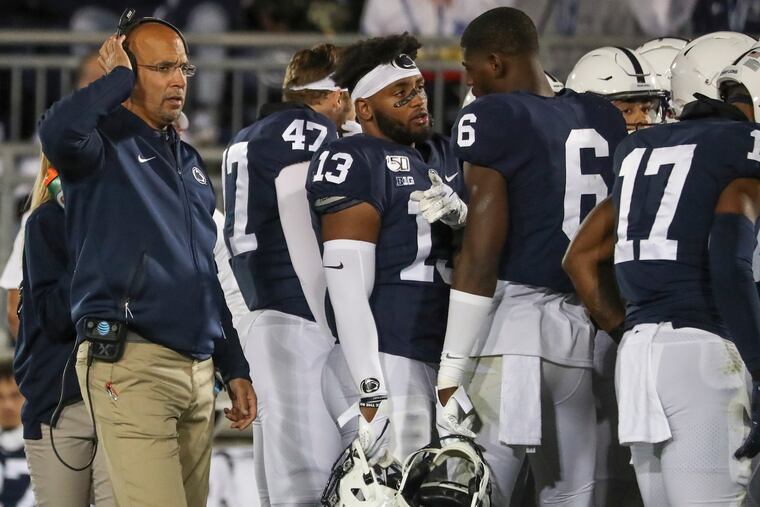Coach James Franklin is satisfied with the Big Ten football decision, but more challenges await Penn State
The main goal is making sure his players stay safe, and that means they must be accountable to their teammates and coaches.

All the while that Penn State head coach James Franklin worked with his team on the practice field the previous five weeks, he was hustling behind the scenes to find out answers – mostly unsuccessfully – for players and parents about the next step of Big Ten football and when (if?) there was going to be a season amid a pandemic.
Franklin was the most persistent and passionate voice among the 11 Big Ten universities that initially voted against a fall football season last month. He questioned the timing and the process of the Aug. 11 decision not to play. He felt communication from the conference office was poor.
However, a tense weekend of waiting for another vote after the Big Ten Council of Presidents and Chancellors heard updated information on COVID-19 testing and other protocols turned into satisfaction for Franklin, his players, and their parents Wednesday with a vote to start the season the weekend of Oct. 23-24.
When he appeared Thursday on a Zoom call with Penn State vice president of athletics Sandy Barbour, Franklin appeared relaxed, joking with media members and admitting, “I’m somewhat relentless, and I can’t help it.” It almost was as if a weight had been lifted from his shoulders.
“The way I would describe it, I took one weight off and put other weights back on,” he said. "I’m thankful and appreciative that we have this opportunity. I’m just trying to stay open-minded and creative. The frustration comes when you try to make this year like anything else you’ve experienced before. It’s not.
"Sometimes it’s good for me to talk to other coaches and to other colleges and NFL coaches. We’re all dealing with challenges. I’m trying to learn from the other conferences and learn from some of the programs that are ahead of where we are. Those things have been valuable and helpful for me.
“To get some kind of normalcy back is great, but that normalcy comes with a new set of challenges.”
The challenges are many. Of course, the main one is making sure his players stay safe, and that means they must be accountable to their teammates and coaches. Penn State athletics had 50 athletes receive positive results for the coronavirus out of 859 tested in their latest weekly report Wednesday but did not specify how many, if any, were football players.
“We’re going to have to look out for each other and remind each other to make good choices,” Franklin said. "I think the other thing that you realize is that the Big Ten has got very stringent protocols, probably the most stringent protocols in college athletics and maybe even professional athletics.
“So the reality is, if we’re not following the rules, you’re going to be out for a large number of days and miss not only practices but games as well. And nobody wants that, especially in a reduced season.”
Under the new Big Ten medical protocols, a football player who tests positive for COVID-19 must sit out 21 days.
One of Franklin’s other challenges is preparing for the shortened season. The pandemic wiped out an entire spring of football for the Nittany Lions, and they did no contact work in the limited time they practiced before the Aug. 11 halt to the season.
“Some coaches said it on the Big Ten call [Thursday] morning, ‘When was the last time a Big Ten football player tackled anyone?’” he said. “Most of us had no spring practices, so there’s also an aspect of that that we’ve got to get ramped back up and get some tackling in. You can’t go from last season to your first game and never tackle. So there’s got to be a time and a place for that as well.”
Franklin also is concerned about team chemistry, mainly because the coronavirus restrictions prevent him from conducting large team gatherings such as dinners or a barbecues at his house, inviting his players over to watch football on TV, or hosting a bowling outing.
He said that when he planned a dinner with his freshmen and asked his athletic trainer about what he needed to do, the reply was, “You can do it, but you can’t do this. You can’t do this. You can’t do this, and you can’t do this.”
“How does it not be just football, football, football and school without some of the fun things we all do as coaches to build that chemistry that’s important?” he said. “I think that would be one of the challenges.”
Nittany notes
Barbour said the proposed 2020 schedule – nine games in nine weeks, virus permitting – was expected “by the end of this week.” She said that if one team is unable to play on a given week it will be a “non-game,” not a forfeit. … Barbour said that during the week of a game, a list of available players will be certified by the team’s chief medical officer and shared with the opponent but would not be made public unless an individual team wished to do that. … No tailgating will be allowed on campus property “as much as we would love you to be able to do this,” she said. “We’re really asking our Penn State nation to cheer us on, have small home personal pod watch parties, but do it safely.” In addition, she said fans would not be allowed to linger outside Beaver Stadium on game days.